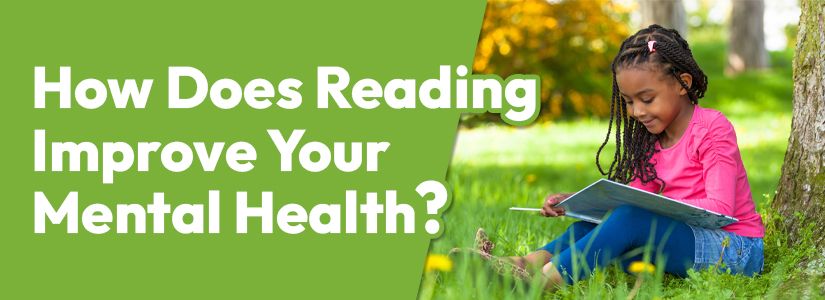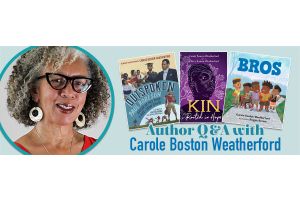How Does Reading Improve Your Mental Health?



May is Mental Health Awareness Month, and here at JLG, we know that reading is a great technique to practice mindfulness, relaxation, and empathy. Reading is an easy and effective way to take care of our emotional, psychological, and social well-being, and it’s even been scientifically proven to improve our mental health! So, the next time you need an excuse to stock your shelves with a new title, just remember, that book could help positively impact a reader’s thoughts, mood, or behavior—we love the power of books! Read on to learn more about the positive effects that reading has on peoples' mental health.
Reading Reduces Stress
—Quite literally! Reading relaxes your body by lowering your heart rate and by easing tensions in your muscles. A study from the University of Sussex in 2009 found that reading can reduce your stress levels by 68%. Furthermore, this study found that people who read for six minutes before completing a stressful task were able to lower their stress levels faster and more significantly than people who tried other stress-tackling techniques like walking or listening to music.
In simple terms, reading provides us a healthy escape from our stressors and allows our bodies to slow down—that is, when we’re reading something that doesn't stress us out further! If you are reading, and hoping to feel a sense of calmness, make sure to pick a book that puts you at ease—like reading about a hobby or a place you’d like to travel to someday. If you are feeling angry, sad, or feelings of hopelessness, stay away from literature (like the news, pieces on book banning, etc.,) that can trigger more of these negative feelings. There are plenty of books at all age levels that can help reduce stress levels!
Reading Creates Empathy
It is imperative that readers see themselves embodied in literature—we all want to feel accepted and understood. When we read books that encourage us to look at situations in new perspectives, we create more room for understanding and build skills to practice empathy. Literature can make us feel less alone in the world and inspire us to address our problems in ways that different characters do.
In a study from 2022 titled, “Benefits of Positive Psychology-Based Story Reading on Adolescent Mental Health and Well-Being”, high school students were given eight different stories to read over the course of four weeks. The stories that they were assigned had “positive psychology themes” like gratitude, compassion, character strengths, mindfulness, empathy, forgiveness, responsibility, modesty, perseverance, and justice. After reading the stories, each student wrote down what they thought the story to be about and then were asked if they had ever experienced such themes in their day-to-day lives. Afterwards, they were asked to practice these activities in their daily lives.
Researchers found that after reading these texts, the high school students were more willing and likely to adjust their behavior to fit the positive themes that they read about. Their results showed that reading the eight selected stories “led to improvement in students’ mindfulness, optimism, happiness, and overall positive emotions, and caused reduction in depression, anxiety, pessimism, and other negative emotions”. This study exemplifies the power of reading and how readers can learn to become more understanding and act in ways that practice empathy through the teachings of literature.
Reading as Therapy, or Bibliotherapy
Bibliotherapy is the process of “reading, reflecting, and discussing literature” to help change a behavior; normally, a subject expert or therapist will assign the readings to a patient. People who practice bibliotherapy may want to solve a reoccurring issue in their life, heal from past traumas, or prompt personal growth—and they do so through books! Bibliotherapy uses guided reading as a way for people to learn about how others have faced the same problems that they are going through. Readers may learn vicariously through the character, contemplating different ways they can handle their situation in a safe setting. Discussing the reading is an important step of the process because it provides helpful insight to the patient and helps them communicate how they are feeling.
In a study from 2021 titled, “Bibliotherapy as a Non-pharmaceutical Intervention to Enhance Mental Health in Response to the COVID-19 Pandemic”, researchers found that guided reading had a very positive impact on people struggling with their mental health during or after the Covid-19 Pandemic:
[Bibliotherapy] is a strategy that helps patients, through literature, to cope with their situation by identifying with the experiences lived by the characters, and from reading, to develop their own tools to make better decisions about their health and exercise control over their lives and their illness. It is well-known that literature, as a reflection of human existence, leads those involved to reflect on themselves and their environment, and that, in addition to its esthetic character, it possesses the richness of confronting individuals with their emotions, values, feelings, and conflicts. It is also a way of helping individuals express, live, and solve these. It is an intrinsic character of literature to serve as therapy, catharsis, and cure for any conflict that disrupts our existence, and that is why human beings have always resorted to it (and, of course, also to the arts) in some way as the best medicine for life.
Reading, therefore, is a very useful and efficient way for people to manage their well-being and practice caring for their mental health.
Conclusion
Books provide a special place for people to leave behind their worries and escape into a world filled with new characters and adventures. They also help us to see situations from new perspectives and give us the opportunity to live in someone else’s shoes—all while never leaving the safety of a page! You can help your readers care for their mental health by stocking your collection with books that are representative of every culture and community that your library serves. If you are needing some inspiration or would like to add books to your collection to help address your reader’s well-being, schedule a call with a curation specialist today!






